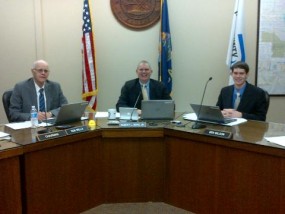
It’s not easy being a county commissioner in the state of Kansas these days.
Riley County Commissioners made the final approval for the county’s 2016 budget Thursday morning, but not before a public hearing saw an audience of nearly 20 observers in attendance. That, of course, is a substantial increase in the normal attendance by everyday citizens, which is usually just one or two people during meetings that happen twice a week every Monday and Thursday morning in the Commission Chambers in downtown Manhattan.
The concern from Thursday’s suddenly active peanut gallery was mixed. Neither of them want an increase in the county’s mill levy — 2016’s mark will be .702 mills higher than 2015’s budget — but neither of them want a cut in services, either.
And when county officials say state revenues for counties have decreased nearly $30 million since 2002, commissioners are put in a nearly no-win situation come budget time — especially in Riley County, where the population has grown drastically since 2002 and demands for services have followed suit.
“No. 1, we appreciate the fact you didn’t raise the mill levy much, if at all,” Riley County Council on Aging Chairwoman Mary Jo Harbour said during public comment. “Second, I would point out to anybody listening to this that when you say we need to cut taxes, you also need to consider what program are you willing to cut?
“Most of these programs, especially the nine that the Council on Aging administer, are very important programs and help keep senior (citizens) in their home, help keep them active and happy.”
Harbour’s agency is one of many that will see cuts in their budgets from the county, and she told commissioners she was frustrated, but understood.
“We understand that you’re cutting us,” she said. “We understand why. But I would point out that you cut us back to less than we got in 2011. That’s a pretty drastic cut.”
Harbour also attacked the idea that private donations can pick up the slack.
“I believe that is naive,” she said. “The organizations that we support… all of these provide services for seniors. They must have competent staff, and they aren’t going to get competent staff if they don’t have a steady source of funding.”
Wells told Harbour there were no easy choices for the commission.
“I’ll take the blame,” he said. “We struggled with what we did.”
Commissioner Robert Boyd agreed.
“We fought over these, we debated,” he said. “We really struggled with who to cut, where to cut and how much.”
Boyd then asked if anyone in the audience was from or represented the Intellectually and Developmentally Disabled — or “IDD” — community, referencing Big Lakes Developmental Center, who also saw significant cuts from the county.
“Those folks saw a far more substantial cut than the seniors did, and they’re defenseless,” he said. “This is not how I want to run a county. This is not what I envisioned.
“I want to see us increase our senior budget, our appropriations. I want to see us contribute to Big Lakes so they succeed and they expand their services. They have a wait list that’s huge.”
Boyd continued that a change needs to happen in Topeka.
“I need help… I need help,” he said. “It’s not going to change until we work on changing the legislature. Far and simple, that’s what we need to do.
“We’ve got to stop the rape of local government.”
Wells also noted delinquent county tax payers as another source of lost funds.
One citizen brought up a department that got an increase, though, and said she didn’t think it was fair for the Riley County Extension agency to get a $20,000 increase in funding while senior programs were cut.
“That concerns me,” she said. “Riley County Extension doesn’t represent the most vulnerable of our population.”
Commissioners didn’t argue with her observation, though Boyd later said the department had been underfunded in the past and was due for an increase. Wells also noted their appropriation was less than what it requested earlier this summer.
Freshman Commissioner Ben Wilson — the youngest on the board at age 22 and a Republican — was largely quiet during the hearing, but said after the budget was approved following his second that the process has been a learning experience.
“I think the budget process has been enlightening to learn more about our relationship with the state,” he said. “When I started running and before I ran I never thought about the relationship between the county and the state, and it’s been enlightening to see how much they effect us and how much they’ve reduced our budgets.
“I don’t really like voting for a tax increase on my first budget.”
Commissioners later cautioned about the future, where a budget lid imposed by the state would cause local governments to hold special elections — at the expense of local governments — on budgets if property taxes exceed the rate of inflation, which local leaders contend is a norm across the state. The lid was supposed to go into effect this year, but push-back from local governments moved it to July 2018. There is talk that it might get moved to July 2017 and local leaders across the state say such a provision would continue to under-fund services even more than they already have been.
Wells took special note of that issue.
“Why do our legislatures think they know better how to run a county, when they can’t even run the state budgets?” he said. “That’s offensive. And you can quote that.”

